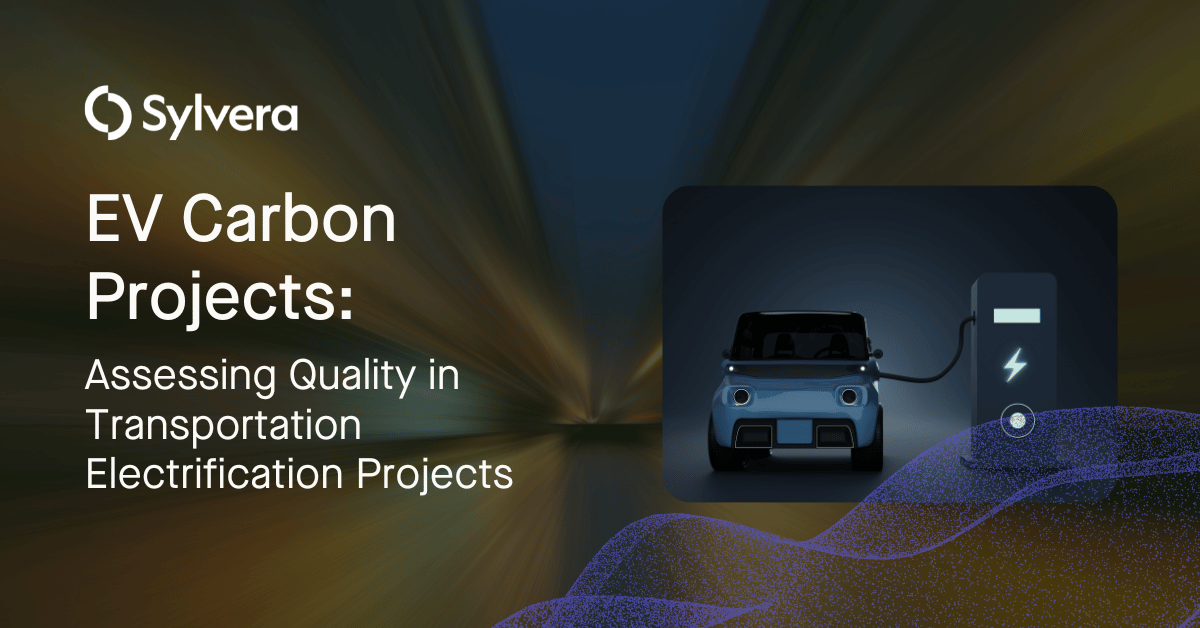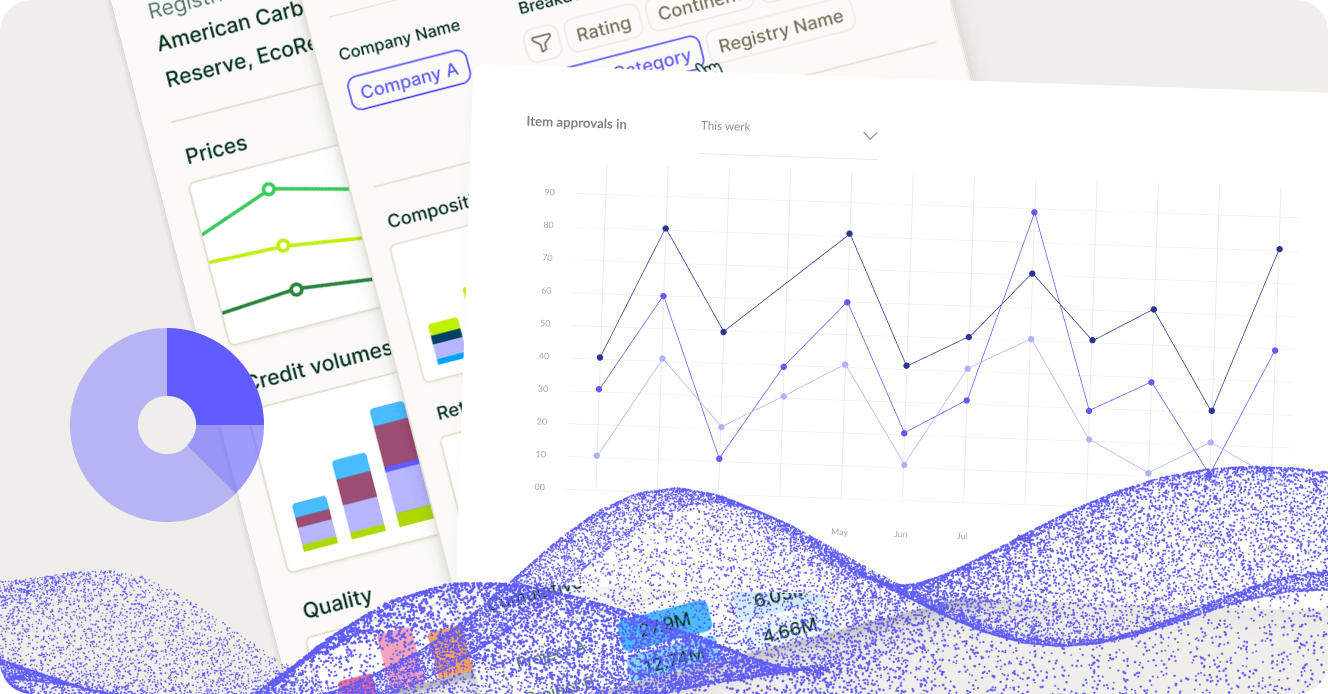“Over the years we’ve invested significantly in our field data team - focusing on producing trusted ratings. While this ensures the accuracy of our Ratings, it doesn’t allow the scale across the thousands of projects that buyers are considering.”
For more information on carbon credit procurement trends, read our "Key Takeaways for 2025" article. We share five, data-backed tips to improve your procurement strategy.

One more thing: Connect to Supply customers also get access to the rest of Sylvera's tools. That means you can easily see project ratings and evaluate an individual project's strengths, procure quality carbon credits, and even monitor project activity (particularly if you’ve invested at the pre-issuance stage.)
Book a free demo of Sylvera to see our platform's procurement and reporting features in action.
The individuals we’ve interviewed come from a variety of backgrounds and their areas of expertise and responsibility are equally diverse. We’ve learned a lot from them in these conversations and are excited to follow their progress.
Q: Hello! Tell us a little about what you do at Carbonext.
A: I’m the CEO of Carbonext, which I founded in 2010. The organization’s mission is to bring awareness to the importance of tropical forests for helping to regulate the world’s climate by removing CO2 and for preserving biodiversity. Carbonext focuses on delivering projects with great environmental and social outcomes.
My role at Carbonext is to lead the vision and strategy for our projects, including scaling up projects so that we can achieve a greater impact, communicate with our stakeholders, such as government, media, land owners and lead the development of the organization's long- and short-term strategies. People development is also part of my role and this position allows me to train young professionals who are interested in making a difference with their careers.
Q: Why did you choose to work in this position and space and what is your background?
A: I’m a forestry engineer with an environmentally focused MBA and I’ve been studying issues about climate change, Since 2002.
It began when I was at the university and started an internship at the Center for Advanced Studies on Applied Economics (CEPEA). During this internship I worked on two studies for the
Brazilian Ministry of the Environment. One focused on the potential of renewable energy from landfills and how to fast-track clean development mechanism (CDM) projects in the Amazon.
Since then, I’ve worked on a daily basis with issues related to climate change and carbon markets. I’ve worked for several companies developing and managing CDM projects as well as reducing emissions from deforestation and forest degradation (REDD+) projects for voluntary carbon markets and have been involved in many types of projects including small hydro plants, wind farms, forestry and cookstoves, among others.
I worked for European companies in the carbon credit development department. I was responsible for supporting acquisition of new clients and projects, assessing CDM project opportunities, conducting feasibility studies and analyzing business opportunities. While I managed Brazilian projects, I was also a reviewer on projects in other countries.
But, in 2010 I decided to found Carbonext to focus on nature-based solution (NBS) projects and thereby bring awareness to the importance of nature in combating climate change. Since 2013 I’ve been a member of the Registration and Issuance Team (RIT) at the United Nations Framework Convention on Climate Change (UNFCCC). I was also elected President of the Brazil Alliance for Nature-Based Solutions and I’m a member of the panel of experts advising on the Voluntary Carbon Markets Integrity Initiative (VCMI).
Q: What are some challenges and opportunities you face in your sustainability role?
A: The biggest challenge we face is to integrate forests into modern society. Forests will not be preserved if we do not interact with them in a better way. We cannot isolate forests from modern society. It has never worked before in any country and it will not work for the Amazon. Humankind needs to understand the importance of forests and respect them accordingly. We need to develop solutions and bring training and development to communities through providing them with the resources they need.
Another challenge is to change the reality of the communities in the Amazon, empower them and bring them to a level of confidence they lack today.
There are also many opportunities created by companies having a greater focus on sustainability or Environmental Social Governance (ESG) issues. There is more investment into ESG and green finance is developing. Many new green jobs are also being created, some in the forest sector.
Q: What skills do you think are particularly vital for you in your sustainability role?
A: Since we deal with a wide range of stakeholders, from landowners in the rustic Amazon to big corporations buying the carbon credits, it’s important to have skills such as clear communication, active listening, conflict management, team-building, collaboration, people development, creativity, open-mindedness and transparency. It’s also important to have a good understanding of ethics and apply it.
Q: What other teams do you work with closely or rely on to be successful at Carbonext?
A: I work closely with my technical and new project acquisition teams. It is very important for me to be close to these teams since we require projects that will deliver high-quality carbon credits. To make sure a project is successful, these teams need to pay close attention to a project’s additionality as it relates to its methodology as well as the contribution, needs and engagement of the local communities involved in the project.
I also interact with the legal team to closely follow all the due diligence processes and its constant improvements, the technology team so that I can stay up-to-date on new trends and opportunities to scale the business and the financial team because it is extremely important to be financially healthy and show excellence in accounting.
Q: What are some trends you’re seeing in the sustainability space?
A: Sustainability is changing how consumers buy and people work. We are changing the way we interact with nature. This is re-shaping business and creating opportunities for new kinds of businesses, from sustainability consulting companies to technological scale-ups designed to combat climate change, and indeed many new businesses are being founded to cater to the ESG goals. As I mentioned before, this is also creating new jobs, some in the forest sector such as roles that deal with forest development, community engagement and biodiversity.
Q: Who are your role models?
A: One of my role models is Thomas Lovejoy. He is a biologist who spent decades in the Brazilian Amazon. He dedicated his life to putting the Amazon on the international conservation map and was also responsible for popularizing the term "biodiversity". In addition he brought attention to the importance of preservation of the Amazon in the fight for climate change.
He wrote: “Forests continue to disappear — cut and burned into ever smaller patches. This failure challenges all of our climate efforts because unless forests remain standing, the world will never contain global warming.”
Q: What advice would you give to the next generation of women+ starting their careers in this space?
A: You do not have to let your sensibilities as a woman compete with men’s sensibilities. Use your own sensibilities in your favor. Trust your instincts and use this to develop your career.
As the book "Women who Run with the Wolves" by Clarissa Pinkola Estés says: "Within every woman there is a wild and natural creature, a powerful force, filled with good instincts, passionate creativity, and ageless knowledge". Let this creature be part of you.
Q: What can organizations do to hire, retain, promote and empower more women+ in the sustainability space?
A: First of all, women should have a voice within an organization and should be heard. Organizations should hire women for management positions and give recognition to her ideas by making sure the whole organization acknowledges that the ideas were hers.
At Carbonext, we have 50% women on staff and we encourage more women to take on leadership roles. We also have policies in place to empower women. We have an “equal pay for equal work experience” policy that helps to address gender and racial discrimination. In addition, we have a policy that states there shouldn’t be a difference of more than 14% between the lowest and the highest paid staff member, including our C-suite leaders. This ensures a lower difference in salaries throughout the company.
Q: What do you think about the role of women+ in the sustainability sector and averting the climate crisis?
A: Pursue happiness. If you do so, your journey is going to be so much fun and filled with great memories and achievements.
It also helps to be aware of the greatness you’re developing. You’re going to construct a better world. It’s not easy but it will be worth it.
And again, as always, learn to listen to your inner voice, your women’s instincts. Don’t suppress it, use it.





.avif)









